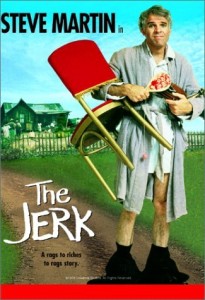 Steve Sipress
Head Rhino & Chief Strategist
Steve Sipress
Head Rhino & Chief Strategist
Joel Orr: Tell a Story. But, How?

To succeed in business, you must be able to tell a story. It’s the way to interest prospects in your products or services. Whether orally or in writing, you have to be able to spin a simple yarn if you want to build a relationship that leads to a sale.
Humans love stories. “Once upon a time …” immediately engages us. I don’t know why; I’m not sure anyone does. But if you just list facts or events, you will lose your audience quickly. If you tell a story, in which one thing leads to another, you will capture them.
The movie “The Jerk” reveals a conflict, and ultimately resolves it in one way or another.
This is easier to do in a blog post or a short story than in a book. Plotting a story “arc” is more difficult when you want to fill 150 pages than if you are trying only to fill one or two. Of course, the short story is an art of its own, and one that is not easy to master. But the book-length story requires logic and intuition. What will engage the reader? What will cause them to care about the people and events of the narrative?
We long for familiarity; we want our stories to follow a pattern we recognize. Evil is punished; good is rewarded; virtue is its own reward. We can be held and entertained by violations of these conventions: We can sympathize with the professional assassin, who only kills bad guys, and want him to “win.” We can feel for the prostitute with the heart of gold.
We expect consistent chronology; first this, then that. Flashbacks are okay, but we need to be anchored in the timeline, or we’ll get confused.
Anton Chekhov, the renowned Russian short-story writer, said, “If in Act I you have a pistol hanging on the wall, then it must fire in the last act.” The story sets up expectations for us, and we feel frustrated if they are not satisfied.
How does a narrative become a story? Here are some ways:
- Chronology
“I was born a poor black child,” says Steve Martin in the film, “The Jerk.” The chronology continues from there.
“It was the best of times, it was the worst of times,” says Charles Dickens in the opening to “A Tale of Two Cities.” We set a stake and continue.
- Causation
It all happened because…
- A question that must be answered
“How was she killed? There was no weapon in evidence, no mark upon her body. Yet it was clear she had not died of natural causes.” Our curiosity is piqued. How indeed?
- A promise
“Although you have never written a sonnet, by the time you’ve completed this slim volume, you will have written one.”
I work mostly with non-fiction writers. Yet the story is just as important in a work of non-fiction as it is in a work of fiction.
What’s your story?

Recent Comments